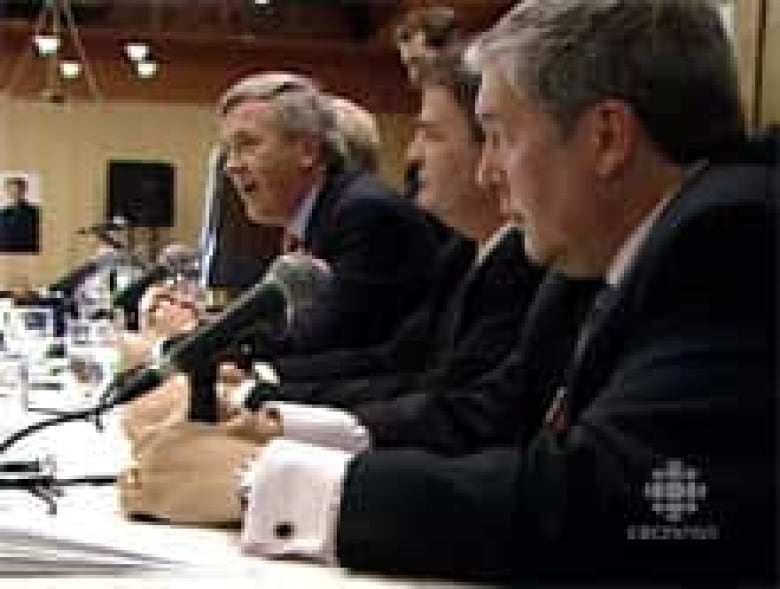Steady Eddie made slow climb to lead Alberta Tories
Stelmach seen as consensus builder, competent manager
The politician affectionately nicknamed Steady Eddie has trudged his way to the top of Alberta's Tories, in a surprise victory for a candidate once considered a dark horse in the leadershiprace.

Stelmach stayed out of it when his rivals traded jabs as the race narrowed. Nor did he seem to have as large of a war chest in the race to replace longtime Tory leader and Premier Ralph Klein.
Instead, the soft-spoken farmer, 55, sold himself as the compromise candidate, already having picked up endorsements from three of the candidates who dropped out after the first ballot.
"From what I've been hearing, a lot of the No. 2 votes are coming to Ed Stelmach so that's very positive," Stelmach said as he made his waythrough snow to cast his vote in the second ballot on Saturday.
Pitching himself as the man Morton and Dinning supporters should pick astheir second choice was a move that ultimately won him the race in a preferential ballot vote.

Most political watchers think Stelmach will be like Klein, without all the fizz and sizzle.
"He's a guy that doesn't like to make sudden moves. They don't call him 'Steady Eddie' for nothing," said political scientist Marco Navarro-Génie.
Keith Brownsey, who alsoteaches political science at Mount Royal College, said Stelmach is a status quo choice for the party.
"He knows how the ship operates, [and] could, if you will, make government work for those policies he's enunciated."
Farmer served in cabinet for decade
Born and raised in the province, Stelmach is the descendent of Ukrainian settlers. His grandparents came from western Ukraine in 1898 and settled on a homestead near Lamont, northeast of Edmonton.

In 1973, while he was studying at the University of Alberta, his older brother died suddenly. He and his new wife, Marie, decided to abandon his dreams of a law career and return to take over the family farm.
Before heading to the Alberta legislature in 1993 as representative of the largely rural riding of Fort Saskatchewan-Vegreville, he served variously as a county reeve, school trustee and health unit board chairman.
Although he has served in Klein's cabinets for the past decade — in agriculture, infrastructure and intergovernmental affairs— his understated personality left him virtually unknown to most Albertans until the leadership race.
Seen as competent manager

"I think there is an appetite for competence. I think there is an appetite for a kind of managerialism— what to do with these enormous surpluses, where Alberta is going with its economic and social future."
Stelmach wants Alberta to strengthen economic ties with British Columbia and the Northwest Territories, and move past the reliance on oil and gas as the province's economic engine.
He says the surprise revenues from $70-a-barrel oil must be pushed into new ideas such as commercialization of energy technology.
He also wants to expand colleges, deliver aid to farmers while the bio-industry is established, pursue a policy of no government interference in the oilsands development, and establish a registry for lobbyists.
Pro-business, hands off
Although his pro-business, hands-off approach to the economy is similar to many in the current Tory cabinet, Stelmach concedes that depending solely on market forces has created stumbling blocks.
"Why boast about the very positive economic indicators if the people cannot access affordable housing or education or have difficulty looking after their families?" he said.
Alberta's relationship with the rest of the country was one of the major themes that emerged in this race,said Brownsey.
"Ed Stelmach, of course, is a former minister of intergovernmental affairs. He has some familiarity with that portfolio, knows the relationship between Edmonton and Ottawa very well."
NDP MLA Brian Mason said hewonders how much Stelmach will be beholden to Morton's supporters for helping him win in the preferential leadership vote.
"I'm very concerned about the very far right and the influence of the social conservatives in the Conservative party and their role in helping to elect Mr. Stelmach."
But those in Stelmach's inner-circle such as Lac La Biche-St. PaulMLA Ray Danyluk insistthe new leaderis his own man.
"A lot of people look at Ed and say, 'Well, you know, Ed's quiet,'" said Danyluk. "I know Ed. Ed's tough. Ed is for all Albertans."
Peacemaker and consensus builder: Evans
Health Minister Iris Evans, one of more than a dozen Tory caucus members who supported Stelmach, said his strength as a peacemaker and consensus builder will bevaluable after the divisive campaign.
'At the end of the day, that's what you want— a great leader who is not simply a figurehead to enunciate or retaliate.' -Health Minister Iris Evans
"At the end of the day, that's what you want— a great leader who is not simply a figurehead to enunciate or retaliate," she said.
"A great leader is also someone in this province and these times who will have to bring together opposing forces and have to deal with the pressures of development and municipal needs."
With files from the Canadian Press